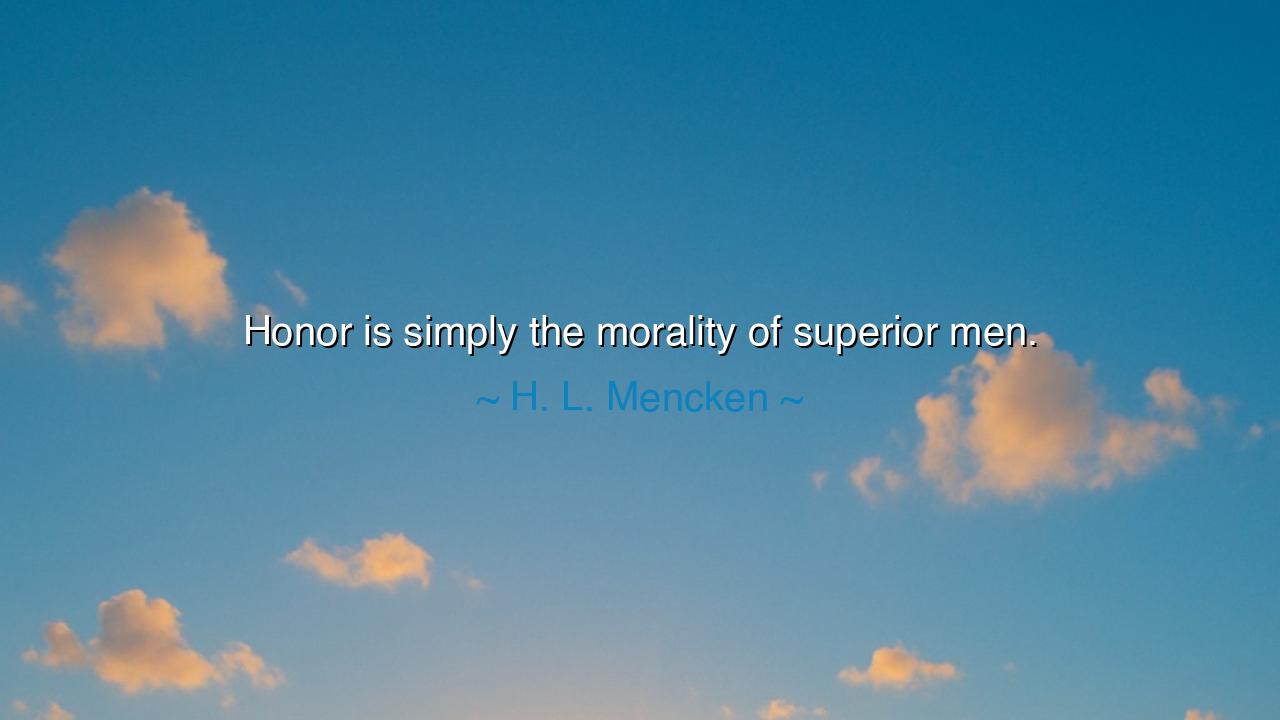
Honor is simply the morality of superior men.






Hear, O keepers of virtue and seekers of truth, the words of H. L. Mencken, the critic and sage who pierced through illusions with sharpness of thought: “Honor is simply the morality of superior men.” This saying, though simple in its form, is deep as a well, for it separates the common rules that bind all men from the higher law that governs the noble. Morality is the fence that restrains the multitude from chaos, but honor is the crown worn by those who rise above necessity, who live by principle even when no punishment awaits and no reward is offered.
The meaning is thus: morality is universal, but honor is rare. Morality demands that men refrain from theft, deceit, cruelty, or betrayal, lest society collapse into ruin. But honor is not satisfied with the bare minimum. It demands truth where lies would profit, courage where fear would excuse retreat, sacrifice where selfishness would be safer. Morality guards the foundations of life, but honor builds its temple. Therefore, Mencken calls it “the morality of superior men,” for it belongs to those who strive to live not merely as good citizens, but as paragons of integrity.
History shines with examples of this distinction. Consider the tale of Marcus Aurelius, emperor of Rome. He possessed all power, could command life and death with a gesture, and yet he governed himself with discipline, humility, and justice. He could have lived as a tyrant, bound only by the laws he imposed, but he chose instead to embody honor, holding himself to higher standards than the world required. This was not mere morality—it was greatness born of restraint and principle.
Or think of Sir Thomas More, who in the court of Henry VIII chose conscience over compliance. Offered safety if he would betray his faith and affirm the king’s will, he refused, though it cost him his life. Morality might have excused compromise for the sake of survival, but honor demanded truth, even unto death. And so, he lives in memory not as a man who obeyed the laws of his day, but as one who stood for a law above all laws: the law of honor.
Yet Mencken’s words also carry weight as a challenge. For not all who are strong are honorable. Many possess wealth, intellect, or influence, yet lack the nobility to govern themselves by higher principles. True superiority is not measured by station, but by conduct. The man of honor is superior not because he is exalted over others, but because he exalts himself over his own temptations, desires, and fears. Honor is the discipline of the mighty heart, the morality of those who could choose otherwise, but do not.
The lesson for us is this: do not be content with mere morality, for that is only the beginning. Morality says, “Do no harm.” Honor says, “Do good, even at cost.” Morality says, “Keep the law.” Honor says, “Live by the truth, even when the law fails.” The path of honor is harder, lonelier, and often costly, but it is the path that elevates man above mere survival and into the realm of the eternal.
As for practical action, cultivate honor in your daily life. Speak truth even when silence is safer. Defend the weak, even when it brings you no gain. Keep your word, even when it costs you dearly. Judge yourself more harshly than the world judges you, for the measure of an honorable man is not in what he gains, but in what he is willing to lose rather than betray his principles. Seek not only to be moral, but to be honorable, and in this, you will walk among the “superior men” of whom Mencken speaks.
Thus, his words endure: “Honor is simply the morality of superior men.” Let us strive to be such men and women—not content with the laws that bind the many, but committed to the higher law that elevates the few. For in a world of compromise, honor shines like a flame in the darkness, guiding not only the one who bears it, but all who walk within its light.






AAdministratorAdministrator
Welcome, honored guests. Please leave a comment, we will respond soon